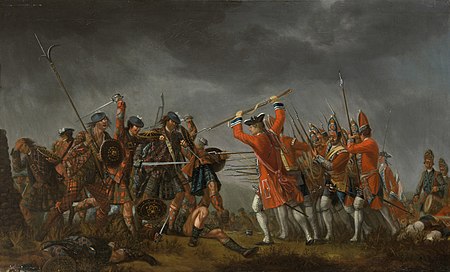The successor to Charles II was King James II of England and Ireland and VII of Scotland. He was forced into exile after attempting to reassert the Divine Right of Kings over Parliament. Parliament offered the throne to his daughter Mary II and her husband William III (aka William of Orange) - William and Mary. So ended the 1688 Glorious Revolution in England (following the War of the Three Kingdoms of which the English Civil War was part).
In England James II was considered to have abandoned the English throne and forfeited the Scottish throne by his attempts to restore a divine right monarchy and undermine the supremacy of Parliament. King James had a son in 1688 and being male, he was next in line to the throne. King James II attempted an uprising in 1689 in Ireland and failed at the Battle of the Boyne. He returned into exile in France for the rest of his life. Queen Anne, Mary's sister, succeeded Mary in 1702 but she died with no heir. Through the Act of Settlement 1701, if Anne died with no heir, the throne would go to Sophia, Electress of Hanover and her protestant descendants. She died in 1698 and the throne passed to her son who would become King George I. The Stuart line ended and the Hanoverian line started.
James' son, James Francis Edward, the former Prince of Wales, claimed to be James III of England and Ireland and James VIII of Scotland. He was known as the "Old Pretender". His followers were known as Jacobites (i.e. followers of James or Jacob in Latin). James attempted a rebellion in 1715. While the rebellion was largely in Scotland, there were also supporters in England. Eventually the Jacobites surrendered to government forces and many were tried for treason and executed and others "transported". Some were pardoned, but others were not. James attempted two more uprisings and was defeated.

The Old Pretender's son was born in 1720 in Rome - Charles Edward Louis John Casimir Sylvester Severino Maria Stuart. He claimed to be Charles III and was known as the "Young Pretender" or "Bonnie Prince Charlie". This is the same person in the tunes such as "Will He Nae Come Back Again", "My Bonnie Lies Over the Ocean" or the "Sky Boat Song". The Young Pretender led the 1745 Uprising which caught the British Government off-guard as it was heavily involved in the War of the Austrian Succession. The Jacobite forces took Edinburgh and defeated government forces at the Battle of Prestonpans. The Jacobites marched into England as far as Preston, but realized that they were not able to advance any further due supply issues and the re-organizing of government forces. The Jacobites were defeated at the Battle of Culloden and with that defeat, so ended Jacobites.
Following the 1745 Uprising, Bonnie Prince Charlie escaped back to Europe. Reprisals were taken against the Jacobites and the supporting population. Lands were confiscated, ranking rebels executed and others transported to penal colonies and the wearing of the tartan was banned (except as a uniform for the British Army). While this may seem harsh, it should be remembered that there were about 1,500 French troops running around in Scotland supporting the Jacobites - and so one is speaking of treason.
It is a common myth that the bagpipes were banned. This is false. Bagpipes were played by the Jacobite army, the clans and the British Army. They were not mentioned in the Act of Proscription of 1746.

It must be remembered that the 1745 Uprising has been romanticised by authors including Sir Walter Scott and Robert Louis Stevenson. I tend to always think of Alan Breck Stewart and David Balfour, characters from Robert Louis Stevenson's Kidnapped etc..
It always surprises me to hear some popular historians to refer to the "English" army fighting the Scots at Culloden. Technically this is not true and it is a bit of a distortion of history in order to serve Scottish nationalism (and the Scottish independence movement). Jacobites included Scottish persons and English persons - they supported the restoration of the Stuart monarch and recognized the lineage from King James II of England or more correctly the United Kingdom. The Jacobite Army included Scots, English, Irish and French regulars. Second, the army that fought the Jacobite army was the British Army, which included four Scottish units and one Irish unit.
Sources
- https://dojouniversity.com/bagpipes-an-instrument-of-war/
- https://www.nts.org.uk/visit/places/culloden/the-battle-of-culloden
- David Balfour
Being Memoirs Of His Adventures At Home And Abroad, The Second Part: In Which Are Set Forth His Misfortunes Anent The Appin Murder; His Troubles With Lord Advocate Grant; Captivity On The Bass Rock; Journey Into Holland And France; And Singular Relations With James More Drummond Or Macgregor, A Son Of The Notorious Rob Roy, And His Daughter Catriona (English) (as Author) - Kidnapped (English) (as Author)
- Kidnapped (Illustrated)
Being Memoirs of the Adventures of David Balfour in the Year 1751 (English) (as Author) - https://www.youtube.com/watch?v=xl9240HWXBU
Skye Boat Song

Speed, bonnie boat, like a bird on the wing,
Onward! the sailors cry;
Carry the lad that's born to be king
Over the sea to Skye.
1. Loud the winds howl, loud the waves roar,
Thunderclaps rend the air;
Baffled, our foes stand by the shore,
Follow they will not dare.
[Chorus]
2. Many's the lad, fought on that day
Well the claymore did wield;
When the night came, silently lay
Dead on Culloden's field.
[Chorus]
3. Though the waves leap, soft shall ye sleep,
Ocean's a royal bed.
Rocked in the deep, Flora will keep
Watch by your weary head.
[Chorus]
4. Burned are their homes, exile and death
Scatter the loyal men;
Yet ere the sword cool in the sheath
Charlie will come again.
